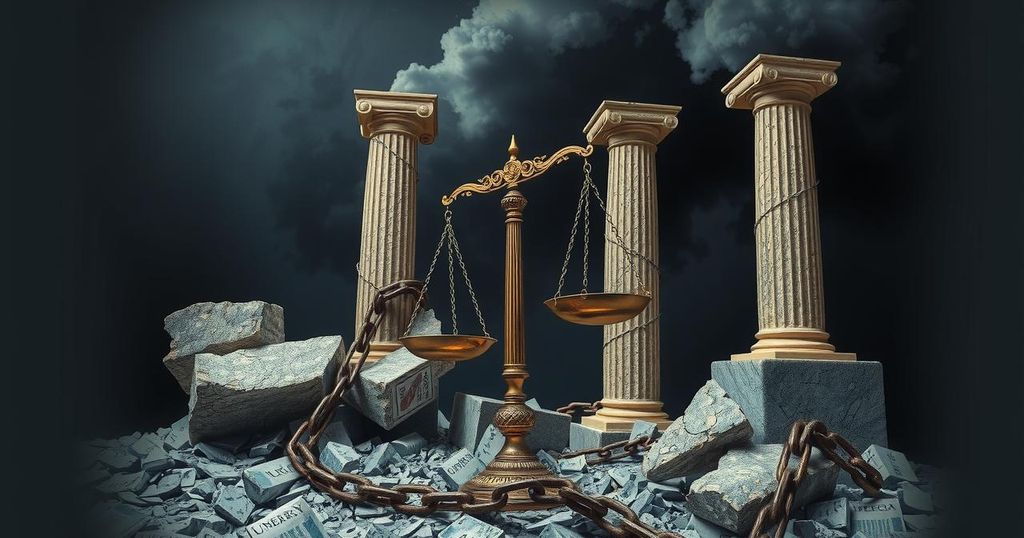The Dismemberment of Democracy in Nigeria
Nigeria’s democracy faces severe threats under President Tinubu’s administration, characterized by electoral failures, nepotism, and suppression of opposition. Critics highlight the inadequacies of INEC, centralization of power, and an alarming crackdown on dissent. As 2027 elections loom, it is essential for citizens to resist any efforts that undermine their democratic rights.
In Nigeria, the concept of democracy traditionally embodies equal opportunity, accountability, and respect for the rule of law, among other tenets. Unfortunately, the current administration under President Bola Ahmed Tinubu appears to be drifting from these principles, which raises serious concerns about the state of democracy in the nation. Over the past two years, many observers argue that the administration’s actions reflect a complete disregard for democratic values, leading to failures across various sectors such as the economy, security, and governance.
The Independent National Electoral Commission (INEC) has come under fire for its inadequacies. Established to manage voter registration and ensure fair elections, INEC has consistently fallen short of fulfilling its mandate. Notably, since the All Progressives Congress (APC) took power in 2015, only 30 percent of applicants have received the necessary Permanent Voters Cards (PVC). This situation has disenfranchised millions of eligible voters, undermining the democratic process.
Adding to the concerns is the issue of nepotism. The Federal Character principle was designed to provide equitable representation across Nigeria’s diverse ethnic groups. However, President Tinubu’s appointments often favor individuals from his Yoruba ethnicity or close connections, sidelining merit and fairness in the selection. This pattern also extends to crucial positions within law enforcement and the military. A stark illustration of this favoritism arises from the controversial Lagos-to-Calabar Coastal Road project, which was awarded without proper legislative oversight or competitive bidding, benefiting a known business associate of the president.
Moreover, the separation of powers—a cornerstone of democracy—seems to be deteriorating. Since assuming office, Tinubu has allegedly taken steps to undermine the authority of both the legislature and the judiciary. Observers note that he seems to centralize power within the Executive, operating as if he alone controls the government rather than allowing for checks and balances. The implications of such control could potentially lead to an authoritarian governance style.
The attempt to weaken opposition parties is another concerning development. Tinubu’s administration has reportedly infiltrated rival political groups, particularly targeting the Peoples Democratic Party (PDP) and smaller parties like the Labour Party, weakening opposition voices. Critics suggest that this strategy aims to render the APC the only viable political entity, destabilizing pluralism in Nigeria’s political landscape.
Civil society groups, journalists, and dissenters are facing increased pressure. Under Tinubu’s leadership, there has been a noticeable clampdown on individuals and organizations calling for greater accountability. Furthermore, in what some see as a brazen move against democratic norms, Tinubu unilaterally declared himself the APC’s candidate for the 2027 elections without allowing due process, reflecting a deep-seated contempt for democratic practices.
As the country gears up for the 2027 elections, the stakes are high. Tinubu’s ongoing actions suggest a concerted effort to monopolize power within his party, effectively positioning himself as the sole candidate and minimizing the role of opposition. Advocates for democracy argue it is crucial for citizens to resist these attempts to curtail their voting rights and uphold the democratic principles that are supposed to govern Nigeria.
In summary, Tinubu’s tenure raises pressing questions about the health of democracy in Nigeria. The erosion of electoral integrity, the rise of nepotism, and aggressive suppression of dissenting voices paint a troubling picture. As elections approach, it is vital for citizens to remain vigilant and committed to safeguarding their democratic rights against any encroachments.
In conclusion, President Tinubu’s administration signals alarming trends that threaten Nigeria’s democratic foundations. With electoral manipulation, pervasive nepotism, and a blatant disregard for the separation of powers, the political landscape is shifting toward autocracy. As the 2027 elections approach, it becomes increasingly important for the citizenry to stand firm in defending their rights and ensuring a diverse, democratic process.
Original Source: tribuneonlineng.com




Post Comment